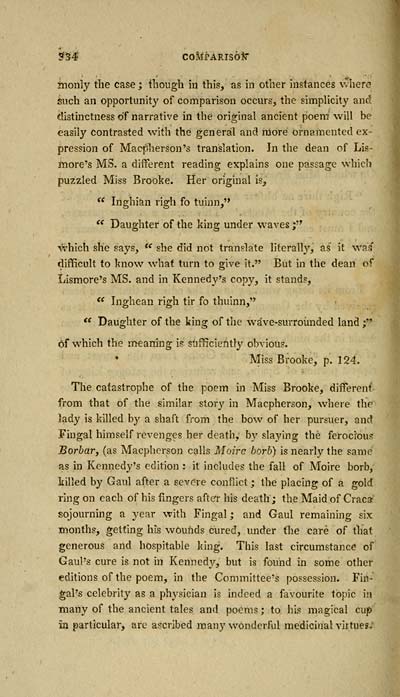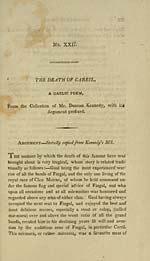J. F. Campbell Collection > Report of the Committee of the Highland Society of Scotland, appointed to inquire into the nature and authenticity of the poems of Ossian
(520)
Download files
Complete book:
Individual page:
Thumbnail gallery: Grid view | List view

5^54 coMPARrsòJf
monly the case ; though in this, as in other instances v/hero
Such an opportunity of comparison occurs, the simplicity and
distinctness of narrative in the original ancient poem' will be
easily contrasted with the general and rriore ornamented ex
pression of Macfiherson's translation. In the dean of Lis-
ràore's MS. a different reading explains one passage which
puzzled Miss Brooke. Her original is,
" Inghian righ fo tuinn,"
" Daughter of the king under waves ;■'
which she says, " she did not translate literally, as' it was
difficult to know what turn to give it." But in the dean of
Lismore's MS. and in Kennedy's copy, it stands,
" Inghean righ tir fo thuinn,"
" Daughter of the king of the wàve-surroùnded land ;*'
of which the incaning is sufficiently obvious.
Miss Brooke, p. 124.
The catastrophe of the poem in Miss Brooke, different
from that of the similar storj' in Macpherson, where the
lady is killed b}' a shaft from the bow of her pursuer, and
Fingal himself revenges her death, by slaying the ferocious
Borbar, (as Macpherson calls Moire borb) is nearly the same
as in Kennedy's edition : it includes the fall of Moire borb,
killed by Gaul after a severe conflict ; the placing of a gold
ring on each of his fingers after his death; the Maid of Craca
sojourning a year with Fingal; and Gaul remaining six
months, getting his wounds cured, under the care of that
generous and hospitable king. This last circumstance of
Gaul's cure is not in Kennedy, but is found in some other
editions of the poem, in the Committee's possession. Firt-
gal's celebrity as a physician is indeed a favourite topic in
many of the ancient tales and poems ; to his magical cuj!»
in particular, are ascribed many wonderful medicinal virtues:
monly the case ; though in this, as in other instances v/hero
Such an opportunity of comparison occurs, the simplicity and
distinctness of narrative in the original ancient poem' will be
easily contrasted with the general and rriore ornamented ex
pression of Macfiherson's translation. In the dean of Lis-
ràore's MS. a different reading explains one passage which
puzzled Miss Brooke. Her original is,
" Inghian righ fo tuinn,"
" Daughter of the king under waves ;■'
which she says, " she did not translate literally, as' it was
difficult to know what turn to give it." But in the dean of
Lismore's MS. and in Kennedy's copy, it stands,
" Inghean righ tir fo thuinn,"
" Daughter of the king of the wàve-surroùnded land ;*'
of which the incaning is sufficiently obvious.
Miss Brooke, p. 124.
The catastrophe of the poem in Miss Brooke, different
from that of the similar storj' in Macpherson, where the
lady is killed b}' a shaft from the bow of her pursuer, and
Fingal himself revenges her death, by slaying the ferocious
Borbar, (as Macpherson calls Moire borb) is nearly the same
as in Kennedy's edition : it includes the fall of Moire borb,
killed by Gaul after a severe conflict ; the placing of a gold
ring on each of his fingers after his death; the Maid of Craca
sojourning a year with Fingal; and Gaul remaining six
months, getting his wounds cured, under the care of that
generous and hospitable king. This last circumstance of
Gaul's cure is not in Kennedy, but is found in some other
editions of the poem, in the Committee's possession. Firt-
gal's celebrity as a physician is indeed a favourite topic in
many of the ancient tales and poems ; to his magical cuj!»
in particular, are ascribed many wonderful medicinal virtues:
Set display mode to: Large image | Transcription
Images and transcriptions on this page, including medium image downloads, may be used under the Creative Commons Attribution 4.0 International Licence unless otherwise stated. ![]()
| Permanent URL | https://digital.nls.uk/81748493 |
|---|
| Description | Volumes from a collection of 610 books rich in Highland folklore, Ossianic literature and other Celtic subjects. Many of the books annotated by John Francis Campbell of Islay, who assembled the collection. |
|---|
| Description | Selected items from five 'Special and Named Printed Collections'. Includes books in Gaelic and other Celtic languages, works about the Gaels, their languages, literature, culture and history. |
|---|

